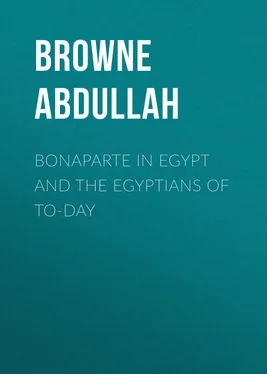Abdullah Browne - Bonaparte in Egypt and the Egyptians of To-day
Здесь есть возможность читать онлайн «Abdullah Browne - Bonaparte in Egypt and the Egyptians of To-day» — ознакомительный отрывок электронной книги совершенно бесплатно, а после прочтения отрывка купить полную версию. В некоторых случаях можно слушать аудио, скачать через торрент в формате fb2 и присутствует краткое содержание. Жанр: Историческая проза, foreign_antique, foreign_prose, foreign_language, на английском языке. Описание произведения, (предисловие) а так же отзывы посетителей доступны на портале библиотеки ЛибКат.
- Название:Bonaparte in Egypt and the Egyptians of To-day
- Автор:
- Жанр:
- Год:неизвестен
- ISBN:нет данных
- Рейтинг книги:4 / 5. Голосов: 1
-
Избранное:Добавить в избранное
- Отзывы:
-
Ваша оценка:
- 80
- 1
- 2
- 3
- 4
- 5
Bonaparte in Egypt and the Egyptians of To-day: краткое содержание, описание и аннотация
Предлагаем к чтению аннотацию, описание, краткое содержание или предисловие (зависит от того, что написал сам автор книги «Bonaparte in Egypt and the Egyptians of To-day»). Если вы не нашли необходимую информацию о книге — напишите в комментариях, мы постараемся отыскать её.
Bonaparte in Egypt and the Egyptians of To-day — читать онлайн ознакомительный отрывок
Ниже представлен текст книги, разбитый по страницам. Система сохранения места последней прочитанной страницы, позволяет с удобством читать онлайн бесплатно книгу «Bonaparte in Egypt and the Egyptians of To-day», без необходимости каждый раз заново искать на чём Вы остановились. Поставьте закладку, и сможете в любой момент перейти на страницу, на которой закончили чтение.
Интервал:
Закладка:
If socially and otherwise the Egyptians profited but little from the establishment of the Caliphate, they gained still less from the domination of the Turks. To the people, indeed, this change was scarcely more than a mere nominal one. It left them practically under the same rulers, for though the system of government was modified, it placed the executive power, if not in the hands of the same men as before, at least in those of men of the same stamp, who ruled them as their predecessors had done, in the same manner, through the same agents, and with the same cruelty and wanton oppression. Yet the Turkish, like the Arab, conquest wrought one important effect, the influence of which time has strengthened so that it is only second to that in the urgency of its bearing upon existing conditions. Under the Arabs the Egyptians had been ruled by foreigners, but by foreigners who were in some degree allied to them. Under the Turks their sovereign was, and is, not only a foreigner, but one of an utterly alien race, wholly separated from them by language, character, habits, by everything, indeed, save the bond of their common religion. None the less a spirit of loyalty to the Turkish Empire has grown and spread among the people, which, though it would be an error to credit it with the intensity popular writers of the country ascribe to it, has unquestionably a powerful influence upon the views and opinions of the great majority of the people. To Europeans this loyalty, which, it is worthy of mention here, is shared by the Moslems of India, has always appeared somewhat of an enigma. No one, however, who knows the peoples of the two countries can doubt that, apart from the fact of the Sultan being the official head of their religion, their loyalty to him is largely due to the desire of peoples who have lost the place they once held in the comity of nations to associate themselves with such kindred peoples as have in some extent maintained their ancient status. The Indian and the Egyptian Mahomedans alike look back to the time when Islam was the one dominant, unopposable power in their native lands, and, conscious of their own fallen condition, would fain relieve the darkness of their destiny by seeking a place, however humble, within the only radiance they can claim to share. While, therefore, the loyalty of the Egyptians to the Turkish Empire is only a part of their loyalty to their religion, it has this, from the political point of view, important difference – that it is not irrevocable, but more or less dependent upon the Sultan maintaining his political supremacy in the Mahomedan world, for should he lose the position he holds as the most powerful ruler in Islam, not only the Egyptians, but his own immediate subjects, would feel justified in transferring their allegiance to any ruler who might succeed him. But absolutely as the Sultan may depend upon the loyalty of the Egyptians as against any non-Moslem Power, yet, as we shall have occasion to see, not only can he not do so as against a Moslem rival, but he can only ensure their loyalty and obedience as his subjects by ceding to conditions they hold they have a right to impose upon him. Were, therefore, the hopes of the large section of the Mahomedans which is filled with the desire for the restoration of an Arab Caliphate to be realised it would entirely depend upon circumstances that it is quite impossible to foresee – whether the Egyptians would or would not remain faithful to the Empire. Meanwhile the revival of the Arabic power being a possibility too far removed from probability to take a place in the politics of the day, the loyalty of the Egyptians to the Turkish Empire must be accepted as a controlling feature in the affairs of the country.
Such, then, are the links that bind the Egypt of the present day to the Egypt of the past, but important as has been, and is, the part that the Arab and Turkish conquests have played in shaping the present and will yet have in moulding the future of the people, it was not to these events but to others occurring outside the country that we owe the inauguration of the modern period of Egyptian history.
What these events were and how they affected the making of the Egyptian what he now is we have now to see.
CHAPTER III
THE DAWN OF THE NEW PERIOD
The period which was to be that of the regeneration of Egypt and its people was ushered in by social and political storm and tempest. But the first warning note of its coming, after a brief moment of panic, was unheeded by the people. Nearly three centuries had passed since the country had been invaded by an enemy. That enemy was now the sovereign Power, and under the grasping, selfish rule of its executive the trade and commerce of the country had almost entirely disappeared, and thus isolated from the rest of the world the people had no conception of the growth of the power and civilisation of the European nations. They were, therefore, completely ignorant of the events and political impulses that were, though for the moment indirectly only, shaping the future that lay before them.
There were both Englishmen and Frenchmen in the country at the time, but the rulers of the land, arrogant in their petty might, and the people not less so in their degradation, alike held all foreigners in contempt, and thus profited nothing from their presence. They had, therefore, no means of knowing what the relations between the two great European Powers were, or of anticipating how those relations were liable to affect their country. Yet the fact that brought about the opening of the modern period in their history and thus decreed the ultimate fate of the country was the mutual hostility that swayed the two Powers. This hostility had no relation to Egypt or its people, and, but for contributing causes, could never have affected these, yet it was the desire of the French Government to strike what it fondly hoped would prove a decisive blow at the growth of English power in the East, that was the chief inspiring cause of its decision to order the invasion of Egypt. The Directory, which was at the time the governing body in France, had indeed more than one reason for taking this step, nor was it under the Directory that the eyes of the French had been turned to the valley of the Nile for the first time. Leibnitz, in 1672, had urged upon Louis XIV. the conquest of the country as an object worthy of his attention, declaring that the possession of it would render France the mistress of the world, and though nothing was done at that time to realise the far-seeing policy he advocated, there can be no doubt that the idea was never abandoned. Talleyrand, indeed, said that on his accession to office, he had found more than one project for its accomplishment lying in the pigeon-holes of the Foreign Office, and he himself entered heartily into the scheme, believing that it would be a most important move towards the fulfilment of his theory that the future of France depended upon the extension of her influence along the shores of the Mediterranean. Volney, the traveller and author of the "Ruins of Empires," having visited Egypt had, in 1786, reported that it was in a practically defenceless condition, and Magallon, the French Consul at Alexandria, having for years urged the Government to interfere on behalf of its subjects in Egypt, had, in 1796, made a voyage to France with the express purpose of protesting against the indignities and ill-usage from which they were suffering, and fully confirmed the views of Volney and Leibnitz. The Directory were thus at once shown the possibility of acquiring a colony of the utmost value and provided with a reasonable excuse for its annexation. These and other arguments, against which the fact that the French nation was then at peace and on good terms with the Sultan of Turkey, the sovereign of the country, weighed as nothing, decided the Directory. In March, 1798, therefore, the order to organise an expedition for the conquest of Egypt was given to Bonaparte, and two months later, on May 19th, he set out in command of a vast armada, sailing from Toulon and other ports of the south of France.
Читать дальшеИнтервал:
Закладка:
Похожие книги на «Bonaparte in Egypt and the Egyptians of To-day»
Представляем Вашему вниманию похожие книги на «Bonaparte in Egypt and the Egyptians of To-day» списком для выбора. Мы отобрали схожую по названию и смыслу литературу в надежде предоставить читателям больше вариантов отыскать новые, интересные, ещё непрочитанные произведения.
Обсуждение, отзывы о книге «Bonaparte in Egypt and the Egyptians of To-day» и просто собственные мнения читателей. Оставьте ваши комментарии, напишите, что Вы думаете о произведении, его смысле или главных героях. Укажите что конкретно понравилось, а что нет, и почему Вы так считаете.












